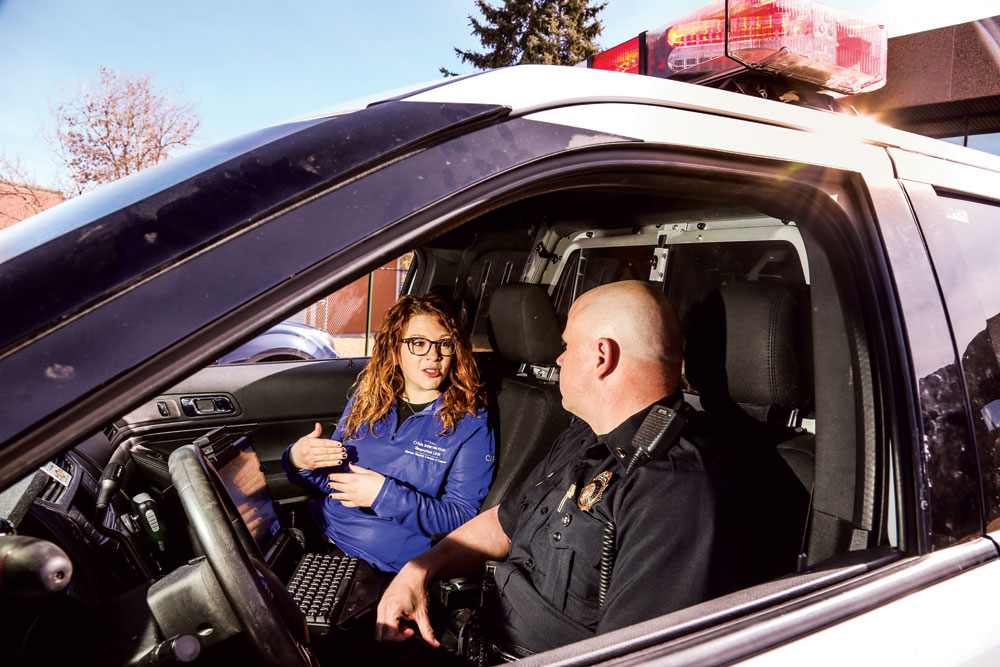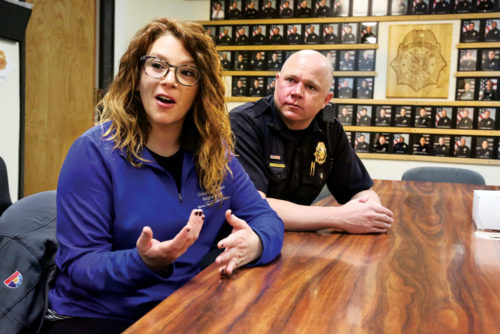
When social workers like Samantha Rabins (left) are paired with police officers, they can help “bridge the gap to help us resolve whatever situation is at hand,” says Lt. Ian Culverhouse (right).
Intersections between mental illness and crime have been prominent in the news lately. Law enforcement officers and high school students are among those who’ve been killed by perpetrators with a history of mental illness. But even in garden-variety crises, mental health issues impact victims, perpetrators, families and communities.
That’s why Denver Police Department (DPD) partnered with the Mental Health Center of Denver (MHCD) to provide mental health support through a co-responder program, where licensed clinicians are paired with patrol officers. The teams work together to address emergency calls where mental health services can help.
The program aims to divert those experiencing a mental health crisis away from jail and towards behavioral health services that can help prevent future crises.
Since its inception in 2016, co-responder teams have responded to approximately 1,200 calls a year. “In the past two years, it’s only been about a three percent arrest or citation rate,” said Chris Richardson, the MHCD program manager. “About 33 percent of individuals we’ve had contact with have actually been brought into formalized treatment.”
Samantha Rabins, a licensed clinical social worker, has been working with the unit since its inception. Like the other three clinicians who currently staff patrols, she works in three-week rotations across the district, from 10am to 10pm. “That allows us some time to do follow ups in the morning, referrals we get from officers or other community agencies…or just follow-ups with people we meet personally in the community,” said Rabins.

As Lt. Ian Culverhouse looks on, social worker Samantha Rabins explains how her work with the police can help reduce repeat 911 calls by connecting people to the long-term resources they need.
In District 5, Lt. Ian Culverhouse said, “We’ve reduced the calls for service because of this program. If they’re not out on calls, they’ll be making phone calls, working on their case files, really following up.” As a result of this follow-up, unnecessary 911 requests from repeat callers have been reduced, according to Rabins.
The co-responders typically ride with an officer for eight hours a day, addressing situations where the services of a social worker seem most needed. Issues might include domestic violence, suicide threats and welfare checks. “A lot of people, when they’re in crisis, even if it’s not criminal, the police are there. That’s who they call,” said Rabins.
Having a social worker along on calls also helps law enforcement officers. “It disarms people. Sometimes the uniform can increase anxiety,” said Culverhouse. “So when they see a civilian partnered with us, it really helps bridge the gap to help us resolve whatever situation is at hand.”
District-wide, co-responders have become popular with the police department. “It’s been insanely productive,” said Richardson. “The best part of this program is it [addresses] that one person that’s kind of been an ongoing stressor to the district, a stressor to officers. And being able to help just one person, word kind of spreads like wildfire [among police officers].”
Fortunately, MHCD recently learned that they will get more funding to expand the popular program. An additional $1.2 million will help the unit grow to include 15 case workers. This will allow two social workers to be assigned to each of the DPD’s six districts, seven days a week, 12 hours a day, in addition to continuing coverage on site at the jail.
Program funding is covered by the Denver’s Office of Behavioral Health Strategies, a program instituted by Mayor Hancock, in addition to funding from Medicaid through the Colorado Department of Health Care Policy and Financing.



0 Comments